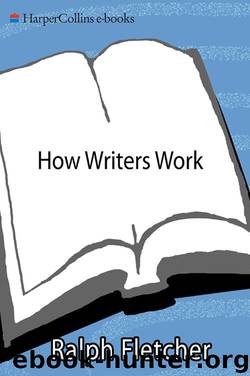How Writers Work by Ralph Fletcher

Author:Ralph Fletcher
Language: eng
Format: epub
Publisher: HarperCollins
Are there any places where my reader might get confused? Do I wander off my topic?
Have I left out information the reader needs in order to understand what I’m trying to say?
It takes a long time to get good at rereading your writing. At first it may feel awkward trying to read your own words from the perspective of another reader. Here are a few tips for making this work:
Build on strengths. When I reread my work I first try to identify the good parts. Often it’s not much, only a sentence or two. I challenge myself to make the rest of the piece worthy of those places where the writing really sings.
Reread with pencil in hand. That way you can mark places for possible changes. Victoria, a seventh grade writer, uses those yellow Post-its as she rereads. She jots notes to herself, sticks them to her draft, and uses them as a guide during the revision process.
I like this idea, though I don’t tend to use Post-its. As I reread, I write codes in the margins to help me get ready to revise. I make a large ! in the margins where it sounds good; I’ll put a big ? where I’m afraid it might sound confusing. I might even write myself a note—“Say this better”—where the words sound rough or awkward. I’ve noticed that rereading with a pencil in hand makes me more alert.
Don’t fixate on spelling mistakes. You can always go back later and fix the spelling, grammar, etc. In this chapter I’m talking about an open-ended, imaginative kind of rereading in which you stand apart from your words and try to figure out ways to make them even better.
Reread it out loud. If you’re in class, you will want to do this with a soft voice so you don’t disturb people around you. As you reread, don’t just look at what the words mean, but also listen to the sound of the words. Reading out loud helps you to get the sound of your words in your head.
I have been working on a playful story for young readers that will be titled, “Where can you find a new nose?” The first page goes like this:
Imagine one day you need
New body parts.
Where might you look?
Where would you start?
If you need a spare leg
Try the leg of a table.
If you need a new eye
Try the eye of a needle.
If you need a new neck
Try the neck of a bottle.
But where can you find a new nose, a new
nose?
Who knows where to find a new nose?
You’ll find a new tongue
In the tongue of a shoe
… etc.
Download
This site does not store any files on its server. We only index and link to content provided by other sites. Please contact the content providers to delete copyright contents if any and email us, we'll remove relevant links or contents immediately.
The Rise and Fall of Senator Joe McCarthy by James Cross Giblin(5259)
Paper Towns by Green John(5163)
The Giant and How He Humbugged America by Jim Murphy(3426)
The Science Book (Big Ideas Simply Explained) by DK(3265)
Eleanor & Park by Rainbow Rowell(3139)
The President Has Been Shot!": The Assassination of John F. Kennedy by Swanson James L(3080)
The Rape Of Nanking by Iris Chang(2803)
Merriam-Webster's Collegiate Thesaurus, Second Edition by Merriam-Webster Inc(2741)
Harry Potter and the Deathly Hallows (7) by J.K. Rowling(2701)
Ancient Worlds by Michael Scott(2661)
Beautiful Oblivion by Jamie McGuire(2595)
Eligible by Curtis Sittenfeld(2574)
Dork Diaries 12 by Rachel Renée Russell(2357)
Sharp Objects by Gillian Flynn(2278)
The Unlikely Pilgrimage of Harold Fry by Rachel Joyce(2256)
Frankly, Frannie by AJ Stern(2192)
The Astronomy Book by DK(2142)
Forensics by Val McDermid(2084)
Who Was Louis Braille? by Margaret Frith(1967)
